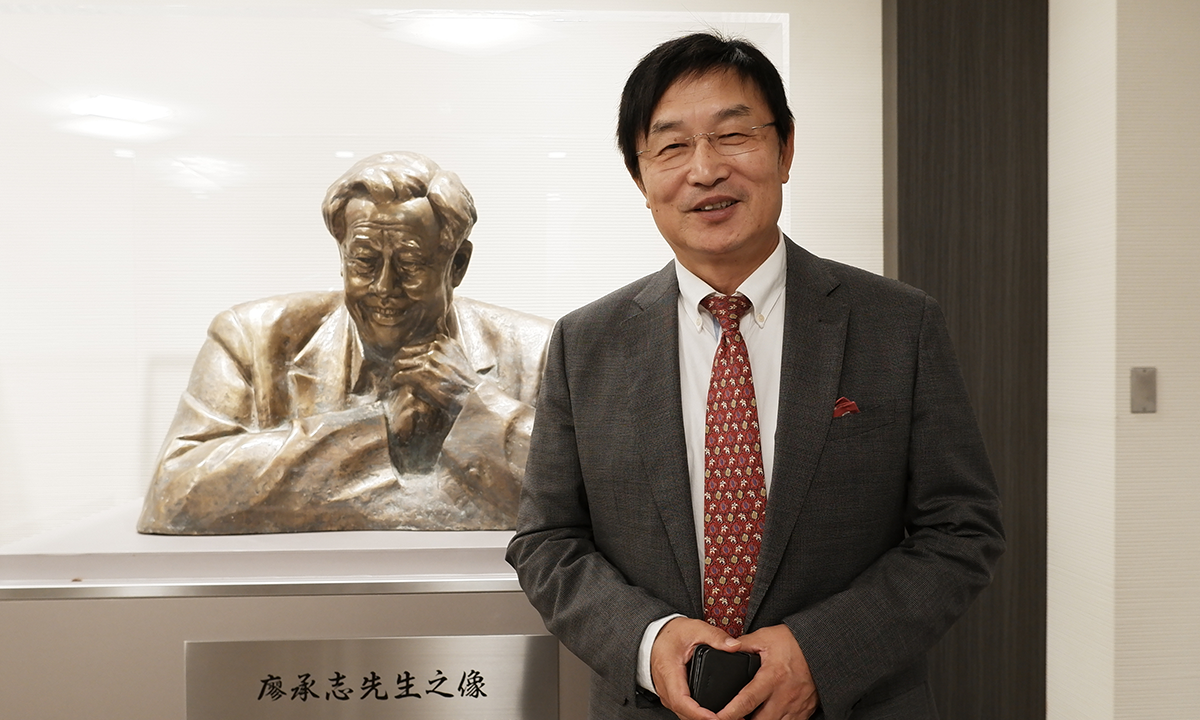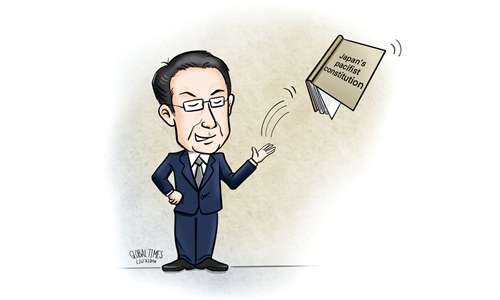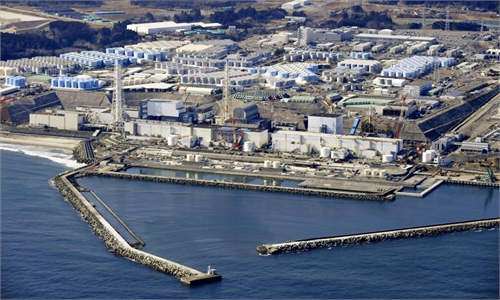Exclusive: People-to-people exchanges between China and Japan rapidly recovering, but ties still at dangerous crossroads: Chinese diplomat

Huang Xingyuan, China's representative director of the Japan-China Friendship Center Photo: Xu Keyue/GT
Marking the 45th anniversary of the signing of the China-Japan Treaty of Peace and Friendship, people-to-people exchanges between the two countries have begun to resume rapidly in a post-pandemic era, while at the same time Tokyo is becoming increasingly aggressive taking a hostile approach in countering Beijing, thus pushing their relations to a "dangerous crossroad, Huang Xingyuan, China's representative director of the Japan-China Friendship Center, told the Global Times in a recent exclusive interview.
Huang expressed his hopes that there will be far-sighted and wise politicians in Japan rather than power manipulators who care more about their own interests and personal gain, so that Japan's national interests and the interests of its people, and that of the region and wider world can be truly served.
However, some Japanese politicians have been pushing the "China threat" theory and "a Taiwan emergency is a Japanese emergency" twin narratives, advocating military expansion, warping the country's diplomacy toward China, Huang noted.
The Chinese diplomat pointed out, considering there is no any outstanding conflict between China and Japan that cannot be resolved or which has impacted bilateral cooperation, whether the two countries can break the ice depends on the future policy of the Japanese government.
First, Tokyo should seek to appropriately manage differences with Beijing, adhere to the China-Japan Treaty of Peace and Friendship, maintain a principle of non-interference in each other's internal affairs. For example, as the Taiwan question is an internal Chinese matter, as long as Japan does not support hegemonic power to provoke or suppress China on similar key issues, China-Japan ties will become increasingly stable and promising.
Second, Japan should not follow the US in labelling China as the "biggest strategic challenge," as it runs counter to Japan's security interests, economic interests and future development interests as well as the China-Japan relations, in addition to its geopolitics and future role in Asia.
Huang expressed his deep concern that an "invisible hand" behind the scenes is influencing the direction of China-Japan ties, that is, the China-Japan relations are not only between the two countries, but also have been affected by the US. He said a number of short-sighted Japanese politicians have always applied the US' measures toward China as Japan's own approach toward China.
Also, some Japanese mainstream media outlets have become attack dogs against China but refuse to cover bilateral exchanges and positive news from China, Huang noted.
Huang stated that some of the recent measures against China seem to have been made under the coercion of Washington, but at the same time have exposed Tokyo has its own initiative. In the past, bilateral ties were prospering economically, but fractured politically, the current atmosphere is impacting both political and economic issues, which is very dangerous and requires urgent attention to restore equilibrium.
To reverse the unhealthy direction of China-Japan ties, we should pin the hope to the more frequent exchanges and communications between the two countries, Huang said. Political exchanges including the visit to China by Japanese Foreign Minister Yoshimasa Hayashi in early April, and the establishment of direct hotlines between Chinese and Japanese defense ministers for maritime, air liaison mechanism, as well as people-to-people exchanges have begun returning to normal in a post-COVID world, which is a good signal for the two countries to improve their friendship, he said.
Under such circumstances, the people-to-people diplomacy has become more significant, Huang stressed.
Last year marked the 50th anniversary of the normalization if China-Japan relations, there were at least 150 events surrounding people-to-people exchanges facilitated through the Japan-China Friendship Center, according to Huang. This warm atmosphere through open events remains important, and the friendship between China and Japan has become a real demand in the people-to-people sphere, as the more and more far-sighted people believe it is time to quickly restore friendly exchanges among the people and inject increased vitality into China-Japan relations.
Huang said, based on his immersive observation of Japanese society in the past two years or so, he feels that China-Japan relations are a combination of the two countries' government relations, security relations, people-to-people relations, cultural exchanges and other aspects. Japan's local governments have a more positive attitude toward China-Japan relations than the central government, and the Japanese people are more friendly than the government. It is worth mentioning that Japan's recent official poll results showed that compared with other age groups, Japan's "Generation Z" has the highest favorable rating for China, and young people have a stronger sense of closeness to China than older people.
The Japan-China Friendship Center frequently organizes online and offline communications between young people from both countries. The communication is frank and sincere, and they generally hold a positive outlook on bilateral ties. As the future belongs to young people, I stand with them and hope for improved China-Japan relations despite any obstacles, Huang said.
While China-Japan ties have produced mixed results, Japan is stumbling to repair its ties with another neighbor - South Korea, under the coercion of the US.
Warming ties between Tokyo and Seoul are not a normal or natural state as Seoul is in a self-inflicted way to pray for the other side to be good to it, which signals the results are not necessarily very good and the effects are not long-lasting, Huang believes.
If Japan can truly reflect on its history, and make up in part for tragic and painful history of the countries it victimized, including China and South Korea, which will be the best means for conciliation between Beijing and Tokyo or Seoul and Tokyo, Huang said.
But now it is just the opposite, he noted. Tokyo continues avoiding historical problems, and the Yoon administration's approach of begging for friendship with Tokyo and allying together against other countries is unusual. It is a temporary friendship orchestrated by the US that secretly wants the regional instability to continue.
The Chinese diplomat also addressed another big concern expressed not only by the Japanese public but also by South Korea, China and more other stakeholders - Tokyo's arbitrary decision to dump the nuclear-contaminated wastewater from the Fukushima Daiichi Nuclear Power Plant into the sea.
A team of South Korean government experts on May 26 concluded their controversial visit to Fukushima Daiichi plant to examine Tokyo's plan, as this inspection confirmed previous public criticism from South Korea - that this was a "three-no" inspection, with no direct sampling, no list of inspection team members being made public, and no media supervision.
Tokyo has acted irresponsibly in its attempt to dump radioactive wastewater regardless of opposition and concern from China, Russia, South Korea, South Pacific Island nations and other stakeholders, Huang stated.
Huang pointed out that Tokyo's dumping decision must have been given a "yes" from the US, raising reasonable estimation that the two sides have exchanged political interests and abandoned the basic principle of protecting public health and livelihoods.
Tokyo should work together with international institutions and other stakeholders and provide a comprehensive and transparent examination of the nuclear-contaminated wastewater in a scientific, responsible attitude before deciding the method of dealing with the wastewater, Huang stated.
"I hope there would be far-sighted and wise politicians in Japan rather than self-interested policymakers who care more about their own personal gains, so that Japan's national interests and the interests of its people, and that of the region and wider world can be truly served," the Chinese diplomat added.




